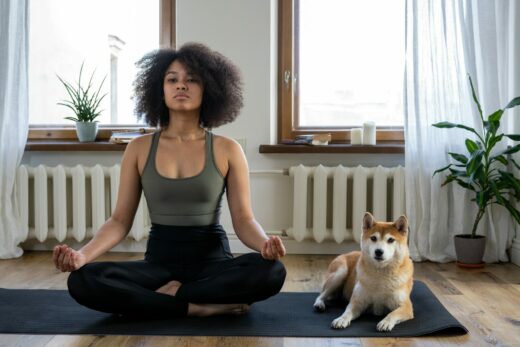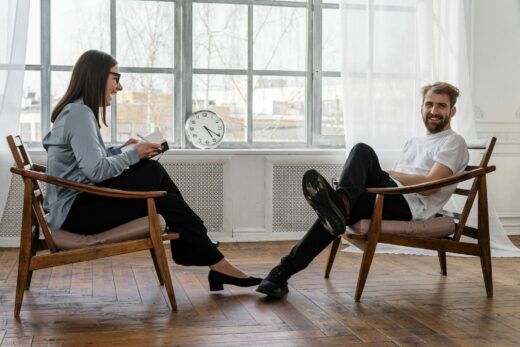Nearly two years of social distancing, isolation, and economic distress have taken their toll on our psyche. The Czech Republic is going through a brutal third wave of COVID-19 and with it come increasingly tougher restrictions, including partial lockdowns and cancellation of Christmas markets. We are all dealing with waves of despair and sadness. All this can easily turn into depression. How can we fight it?

Exercise and pet therapy is a great way to deal with lockdown gloom.
Stress can lead to bad things
According to Covid.gov.cz, stress brought on by the pandemic can lead to anxiety, mood swings, changes in eating habits, sleep issues, and an increased risk of substance abuse. Having to work from home can make most of these worse, as we often forget how to switch off properly, when we “clock out”.
Many people are suffering from these problems at the moment. However, only very few people know where to turn. Additionally, if you’re an expat, finding English-speaking help in Czechia can be difficult. So, what are the options?
Therapy
When dealing with a particularly bad case of depression, anxiety, and other issues caused by the pandemic, the most obvious option is to seek therapy or counseling.
There are a number of English-speaking psychologists and therapists all over the Czech Republic. You can find them by simply typing “Therapy in English [name of your city]” into your search engine.
In Brno, one of these professionals who specialize in supporting international expats and students in Czechia is Dr. Šárka Kárová. Her private practice might be a great choice for expats who have become cut off from their family during the pandemic and are finding integrating into the society even more difficult because of that. Additionally, since Dr. Kárová specializes in psychosomatic medicine, those who have gone through COVID-19 or are suffering from the so-called “Long Covid” may also benefit from her services.
In Prague, one of the best-rated therapists who offer their services in English is Silvia Miklíková. She provides therapy and counseling for those with depression, anxiety, self-destructive behaviour, cross-cultural issues and adjustment issues.
Online therapy
Another option – good for those who want to stay home to avoid risking exposure – is online therapy. You can choose any online therapy provider you want, as long as they’re able to provide their services to you remotely.
BetterHelp is one of such providers. According to their website, they offer therapy for individuals, couples, and teenagers. All you need to do is sign up and you’ll be matched with a licensed counselor. Once you’ve been matched, you can choose the mode of communication that’s the most comfortable to you – messaging, chat, phone, or video. The cost of counseling through BetterHelp ranges from $60 to $90 per week.
Talkspace works in a similar way. They also offer specialised therapy for oppressed groups and minorities, who may be affected by the pandemic even more, for example the LGBTQ+ community. As for the cost, Talkspace members are automatically charged on a recurring basis according to the service package they chose upon sign-up.
Although all such online therapy websites are paid, there’s always a way to get a discount or free trials. If you’re lacking the finances, you can also sign up for 7 Cups, which is an online therapy option that allows you to chat with unlicensed volunteers for free.

Don’t be afraid to ask for help – therapy is a valid form of self-care.
Helplines
If you’d prefer to chat with someone about your problems and worries, you can also call some of the English-speaking Czech helplines published on the Covid.gov.cz website. They are typically free of charge. Some of these helplines include:
- The COVID-19 Information Hotline – 1221
- Psychological First Aid Helpline – 116 123
- The Sluchátko helpline – 212 812 540
- Helpline for victims of domestic violence (White Circle of Safety) – 116 006
Personal coaching
Over everything, it is important to keep yourself in good spirits. How do you do that? According to Cristina Muntean, trainer, mentor and coach of strategic communication skills, personal branding, and emotional and systemic intelligence for leadership, it is important that we take responsibility for our emotions and try not to feel like a victim: “Whenever we’re dealing with a stressor, like this pandemic, we have a tendency to feel like a victim and begin complaining. Unfortunately, when we do this, we reduce ourselves instead of focusing on what we want,” says Cristina.
Indeed, feeling bad in the pandemic can become a vicious cycle. And when you start pulling down your own mood, you will ultimately bring down everyone else’s mood as well. As Cristina stresses: “When we are in the place of the victim, sooner or later we will feel anger and we will look for someone to blame. In that moment, we become the aggressor – someone we might not like.”
In general, focusing on external factors is not useful when we’re trying to deal with bad emotions. Instead, as Cristina suggests, we should start focusing on the desired outcome. Think about what you really want and then do something about it: “I want to be healthy, I’ll do something for my health. I want to feel good. I’ll do something to make myself feel good,” she asserts.
Drowning yourself in sorrow and self-pity is a slippery slope. The key to staying afloat during the pandemic is to do the opposite: “The moment we put our focus on the things we can influence, we gain our power back and become empowered. This is an emotion we want to have and want to give people around us. Then we can overcome everything,” concludes Cristina.
Simple mindfulness tips
Obviously, not everyone has the time or money for therapy. It’s also possible that you feel like your case isn’t bad enough yet to seek professional help. Maybe therapy sessions and helplines aren’t your cup of tea. You can still help yourself feel better by taking better care of your mind and body through simple actions.
For instance, exercise is a fantastic way to relieve stress and keep yourself in good spirits. Find some free yoga videos on YouTube or go for a jog or a brisk walk to get your blood flowing.
Another good way to release stress is by cuddling your pets and taking them out for a walk. Do you have a dog or a cat? Let them give you love and give them love back.
Reading is another great activity to take your mind off the current situation. Curl up on the sofa with a good book and a cup of tea or coffee. Make sure to read something nice and calm, though, no horrors or dystopian fiction.
You’re not alone
Most importantly, remember that you’re not alone. Don’t isolate yourselves even more than the pandemic is already isolating you. If you need help, ask for it.
To feel even less alone, you can also keep in touch with the expat community in Czechia. We have branches in Prague, Brno, Olomouc, Pilsen, and Hradec Králové. You can chat with your fellow expats about the current situation on their social media. You can find our accounts on Facebook, Instagram, and Twitter. You can also follow our blog where they regularly post tips and information for expats.
If you want to keep yourselves informed about the current situation but can’t speak Czech or don’t want to go through the news every day by yourself, you can also subscribe to our weekly newsletter.
Article sources: Expats.cz, Covid.gov.cz, Dr. Kárová’s website, Silvia Miklíková’s website, Cristina Muntean,
Photo source: pixabay.com
